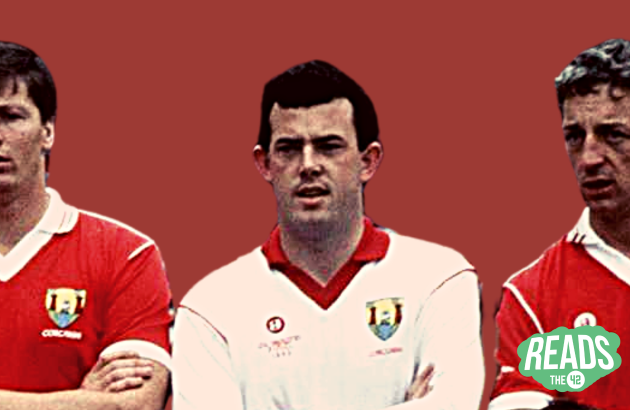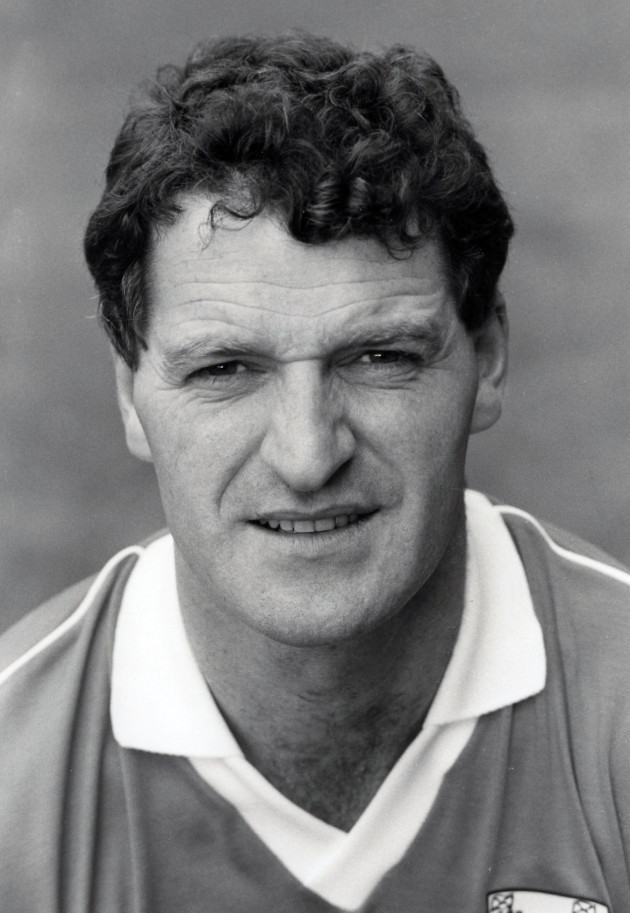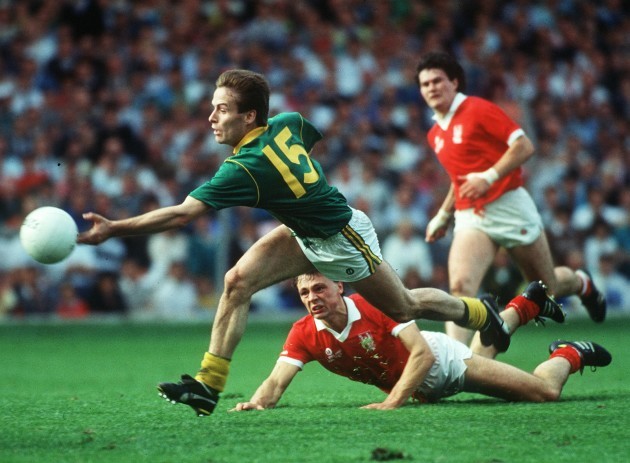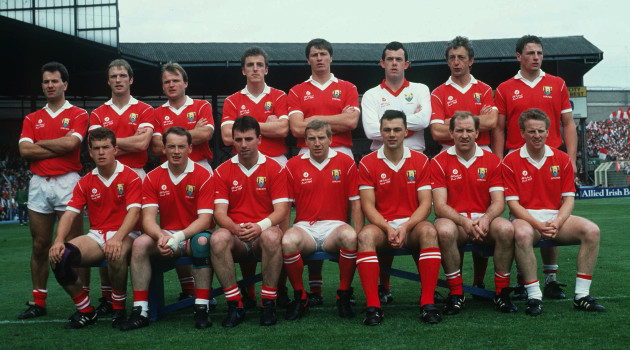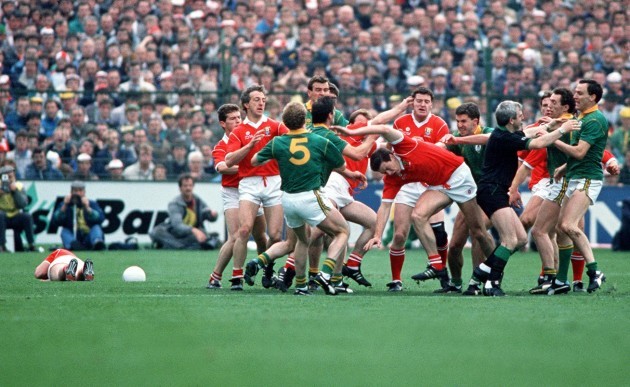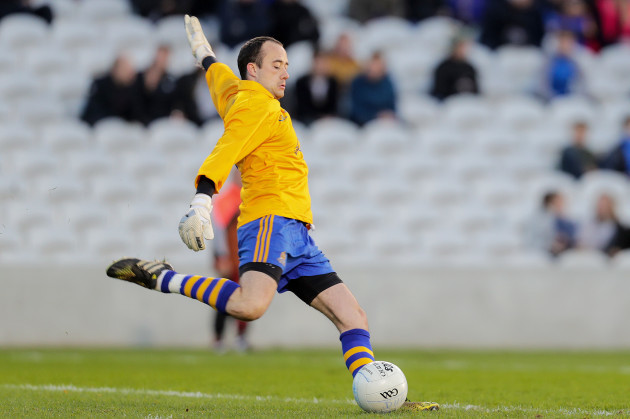IN THE DAYS that followed the death of his best friend, Colman Corrigan penned a tribute for the Sunday Independent.
“I consider myself lucky to have played football and would encourage any young fellow to play sport because he might meet someone like John Kerins,” he told readers.
Corrigan has no shortage of fond memories of Kerins to share, but where better to start than the banquet for the unveiling of the 1987 All-Stars.
That night at the Burlington Hotel, the two nominees were seated at a table with another Corkonian, Tom Monaghan, who was on-site as a representative of sponsors Bank of Ireland.
“Tom knew that the two of us were going to be selected in the All-Star team but he didn’t say a word about it all through the meal, in fairness to him” Corrigan explains.
“Anyway, just before the team was due to be announced – I’ll never, ever forget it – I looked over to my left and saw Kerinsy on his own at the bar, with his elbow resting on the counter.
“He was drinking a pint and he had the biggest smile that you can imagine. Tom was after letting it slip to him that he was getting an All-Star. Then Kerinsy looked down at me and winked. That was good enough for me to know that I was getting one too.
“With the type of fella that Kerinsy was, he wouldn’t have been smiling and going to the bar if he knew that I wasn’t getting one too. He’d have stayed at the table, he’d have kept quiet and he’d have been just as disappointed as me.”
- For more great storytelling and analysis from our award-winning journalists, join the club at The42 Membership today. Click here to find out more >
Corrigan and Kerins first met in 1979, when they found themselves togging out beside one another before attempting to impress the selectors at a Cork minor trial.
Kerins was a city boy, Corrigan hailed from the sticks, but an unwavering friendship was formed as they drove each other on to become the country’s best footballers in their respective positions.
“We became All-Stars together and it was just a brilliant moment,” Corrigan adds. “There was very much a sense of satisfaction from knowing that we hadn’t done too badly for ourselves.”
The bond that Corrigan and Kerins formed as men served them well as footballers too, for they could also be classed as inseparable on the pitch. While wearing the red of Cork, Corrigan, a full-back, knew that the fella watching his house wouldn’t let him down.
“As a goalkeeper, Kerinsy’s ability to read a game was outstanding,” says the Macroom man, who became a back-to-back All-Star when he was selected again in 1988.
“As a back, you always felt comfortable in playing your man from in front, because if you did miss it and it went over your head, you knew very well that you had another back coming behind you – and that was Kerinsy.
“We actually had a pact that if there was a dodgy ball coming in between the full-back and full-forward, Kerinsy was to come out and take everything with him – the ball, the full-forward and the full-back too if necessary. He had no problem in doing that either.
“He would have been deemed as a quiet fella off the pitch, he could be extremely shy, but we hit it off as friends from day one. Getting along with Kerinsy was very easy. He was just a dote of a man.
“He couldn’t actually drive at first so any time we needed to go somewhere I was doing the driving. I used to pick him up and we’d head off to matches or whatever it might have been. More often than not they were long journeys so that helped our friendship to build.”
Having been raised a stone’s throw from The Lough on the southside of Cork, Kerins was a St Finbarr’s clubman. He was a talented goalkeeper in hurling and football, going on to represent his county in both codes at minor level.
A two-time Cork and Munster Club Senior Football Championship winner, Kerins also helped The Barrs to claim All-Ireland glory at Croke Park on St Patrick’s Day in 1987.
Following his Cork senior debut in 1984, he remained in possession of the number one jersey for 11 seasons. He departed the inter-county stage after a semi-final defeat to Down in 1994 that denied him an appearance in a sixth All-Ireland decider. By then, he had collected two All-Star awards, one National League, seven Munster titles and two All-Irelands.
Before the Sam Maguire successes of 1989 and ’90, Kerins and Cork were forced to endure a considerable amount of suffering at the hands of Meath. A formidable Royals outfit, of which Bernard Flynn was a key component, had thwarted the Rebels in the previous two finals.
“The way John Kerins controlled his backline, the way he spoke to them and directed them, he was brilliant at that and – believe it or not – that wasn’t actually something that happened very much back then,” says Flynn. “He wouldn’t have to shout and roar, but he spoke clearly and with authority.
“Cork built their success from the back and John was integral to how organised they were. But what really stood out for me, especially when we would have been away on trips or at functions, was the respect that every Cork player had for him.
“John Kerins was in a different league when it came to humbleness, integrity and carrying yourself with class. There wasn’t a bad bone in his body. He was an amazing gent, a truly great guy.”
When Cork and Kerry met in the 1987 Munster final at Páirc Uí Chaoimh, the hosts were bidding for a rare triumph, having achieved provincial success just once in their previous dozen attempts.
With the game in additional time, Mick O’Dwyer’s All-Ireland champions were staring down the barrel of defeat until Mikey Sheehy conjured a goal that looked set to turn a two-point loss into the most dramatic of victories.
The RTÉ broadcast cut to a shot of forlorn Cork manager Billy Morgan collapsing to the ground with his head in his hands, before showing a replay of the potentially decisive strike.
However, when the cameras returned to the live action, Larry Tompkins was already standing over a free that would deliver an equalising point for a Cork side who went on to record a resounding win in the following weekend’s replay in Killarney.
While the Kerry players had been celebrating Sheehy’s score, Cork were on the charge towards the Blackrock End thanks to the shrewdness of their goalkeeper.
“That cheeky, last-gasp goal by that most prized poacher of majors, Mikey Sheehy, would have left most ‘keepers bewitched, bothered and bewildered,” wrote Donal Carroll in Cork’s Evening Echo.
“But not John Kerins, who, aware that time was of the essence, set up the quickest of counters. It was from that piece of quick-thinking and cool analysis under appalling pressure that Larry Tompkins was presented with the match-saving opportunity.”
Colman Corrigan says: “At the height of his career, Kerinsy had very few flaws in his game. You look at the modern goalkeepers now, like [Stephen] Cluxton and fellas like that – Kerinsy was basically the first goalkeeper who could put a ball into your eye from 50 metres away. He was incredible at hitting fellas on the run, which made it very difficult for the opposition.
“The accuracy of his kicks was unbelievable. What the Mayo goalkeeper did last Saturday night against Dublin – brilliant as it was – Kerinsy was capable of doing that in his sleep.
“His shot-stopping ability was superb as well. He was extremely hard to beat in a one-on-one situation. You always had faith in him to make an important save.”
An All-Star between the posts during his own playing days, Billy Morgan would describe Kerins as a man who “had no peer” as a goalkeeper. According to Morgan, the outcome of the 1989 All-Ireland final was determined by a Kerins save that denied a goal to Mayo’s Anthony Finnerty.
In the ’87 final, Colm O’Rourke raised the only green flag as Meath overcame Cork. When Cork’s revenge finally arrived in the decider three years later, Kerins succeeded in holding Sean Boylan’s side goalless to help his team secure a two-point win.
“I faced him down many times but only ever beat him once,” O’Rourke would later say of Kerins. “It was the same story for all other forwards. Better to take the point rather than risk going for a goal and have him make an inspiring save.”
Following the conclusion of his inter-county career in 1994, Kerins gave two more years of service to St Finbarr’s as a player. Amid growing commitments to his family and profession, he then imparted his experience and expertise via coaching roles with the Togher club.
Shortly after a promotion to the rank of detective with An Garda Síochána, his wife Ann gave birth to the newest addition to the Kerins clan. Arriving after John and Paul, Suzanne was the youngest of three.
While aware that he was once a footballer, John Jr. had been too young to develop an appreciation for his father’s status as GAA royalty. That began to change after the pair travelled together to the 1999 All-Ireland final, in which Meath defeated Cork.
“I was just holding my dad’s hand as we were on our way to our seats in the Hogan Stand, when two fellas came up and stopped him,” the eldest of Kerins’ children, who was aged seven at the time, recalls.
“One of them asked my dad to sign his programme, which I was completely taken aback by. I hadn’t a clue why this was happening. I was like, ‘what’s he doing, dad?’ Obviously as time went by I started to understand it a bit more, but that was maybe the first time it dawned on me that he was a bit more than just my father.”
The Meath and Cork teams contesting that ’99 final looked entirely different to the ones who forged a bitter rivalry that was still simmering when the decade began. There was “a lot of hatred” between the sides, according to Larry Tompkins, who captained Cork to their 1990 All-Ireland win.
Yet in the summer of 2001, tragedy turned adversaries into allies. After John Kerins had taken ill, an appointment was made with former Meath midfielder Gerry McEntee at the Mater Hospital.
On a misty May evening, Kerins sat into the front passenger seat of Colman Corrigan’s car and they set off for Dublin. It would be the last of the many journeys they made together, with McEntee informing Kerins that he was in a battle against cancer that couldn’t be won.
“Kerinsy was in a bit of trouble, we knew that, but we wanted Gerry to verify,” says Corrigan. “Gerry met him and told him what was what, and Gerry was absolutely outstanding.
“Kerinsy and myself spoke about everything on the way up – football, family, the whole lot – and tears were shed. We stopped in a garage at one stage to get a bottle of water and I remember looking at him going through the forecourt. I knew he was struggling and it was hard to see it.
“This was a young man with a wife and three kids, a fella who had achieved so much success for his club and his county, and there you were trying to get your head around the likelihood that this was his last hurrah. It shattered me, to be quite honest. There’s no easy way to process something like that.”
Despite the diagnosis, he confronted his illness with as much defiance as he could muster, resolving to spend his final days doing the things he loved in the company of those who loved him.
Just over three months after he first began to feel unwell, John Kerins passed away aged 39 at Marymount Hospice on 21 August 2001.
He was the second member of Cork’s All-Ireland winning team of 1989-90 to meet an untimely death, after Mick McCarthy had been fatally injured in a road traffic accident in February 1998.
On the day McCarthy was laid to rest, Robbie O’Malley made the long journey to Skibbereen to pay respects on behalf of the Meath team.
A sizeable deputation from the Royal County was able to travel to Leeside for the funeral of Kerins, a gesture that has never been forgotten by those who were present.
The day’s events having taught them that life is too short to hold grudges based on the colour of a fella’s shirt during a game of football, a lot of bad blood was discarded when former foes came together that evening at The Lough Tavern.
“A good few of the Meath lads came down and they were just brilliant,” Corrigan says. “To have them there was extraordinary and it showed the high esteem that they held Kerinsy in.
“It was the start of the breaking of the animosity that had been there for too long. There were rights and wrongs on both sides but we were men enough to get over it eventually. It was Kerinsy who started it off.”
Bernard Flynn, who was among the Meath representatives, adds: “We buried the hatchet with a lot of things and many of the lads remain really good friends to this day. When my Laochra Gael was on TV, I got a number of text messages from the Cork lads, including a really fabulous one from Billy Morgan, which meant a lot.
“A lot of us grew up a bit that day. There was maybe a bit of childishness up until that point, little bits of sniping and silliness, the kind of stuff that you need to let go of. I think men held onto hatred back then much more than they do now. I think it’s healthier that things are no longer like that.
“It’s terrible that it took a tragedy for it to happen, but there was a weight lifted off everyone’s shoulders. John was looking down on us and I don’t know if any other guy could have commanded that amount of respect.
“Ann, John’s wife, was incredible in how she handled it all afterwards with the kids and everything. She’s a phenomenal woman, extraordinary, and I know for a fact that she, above anyone, appreciated the Meath lads going down.”
John Kerins Jr. was nine years old at the time of his father’s passing. His brother was seven, his sister about to turn four.
“There’s a great relationship between our family and the Meath lads,” John Jr. says. “The funeral just seemed to lift all the tension. Any time we’re in Dublin, Robbie [O'Malley] will come down from Meath just to meet for a cup of coffee or a bite to eat. There’s a huge amount of respect there.”
In 2018, John Jr. started in goal and younger brother Paul was also a member of the panel as St Finbarr’s defeated Duhallow to win the Cork Senior Football Championship, ending a 33-year drought that stretched back to his father’s heyday.
A Garda stationed at Gurranabraher, just as his father was prior to his death, John Jr. says: “Even in work now when people come to the front desk and they hear the name, they’ll often ask if I’m related to the goalkeeper. People obviously still have a lot of respect for him and that’s something that strikes a chord with me, definitely.”
For club and county, the greatest accolades in the game were attained by John Kerins, the footballer. In the wake of his passing, of even greater value to his loved ones were the overwhelming expressions of admiration from those who had the privilege of knowing the man.
“I’ll tell you what,” says Flynn, “he’s never been forgotten in Meath. My team-mates, whenever we’ve met up since he passed away, we’ve spoken regularly about him. All these years later, that’s a testament to the man he was.”
Corrigan adds: “Kerinsy would be very proud of the way Ann has been able to raise the three kids. He’d also be extremely proud of the kids and the way they have made their own way in life. That would be the most important thing to Kerinsy because he never wronged anybody in his life. Not once.
“We holiday down in Kerry with a few of the lads [from the Cork team], like Jimmy Kerrigan, Barry Coffey, Paddy Hayes and Mick Slocum was there as well at one stage.
“Any time that we’d get together to drink a few pints, someone will always say: ‘Jesus, wouldn’t it be brilliant to have Kerinsy here’ – we only came back from there a week ago and it’s still the same now. Without a doubt he’d spend the whole time taking the piss out of me or someone else, but I’d love nothing more.
“We’ll never, ever forget him. There isn’t a day goes by that we don’t think about him.”
John Kerins (19 July 1962 – 21 August 2001), RIP.
For more great storytelling and analysis from our award-winning journalists, join the club at The42 Membership today. Click here to find out more >

